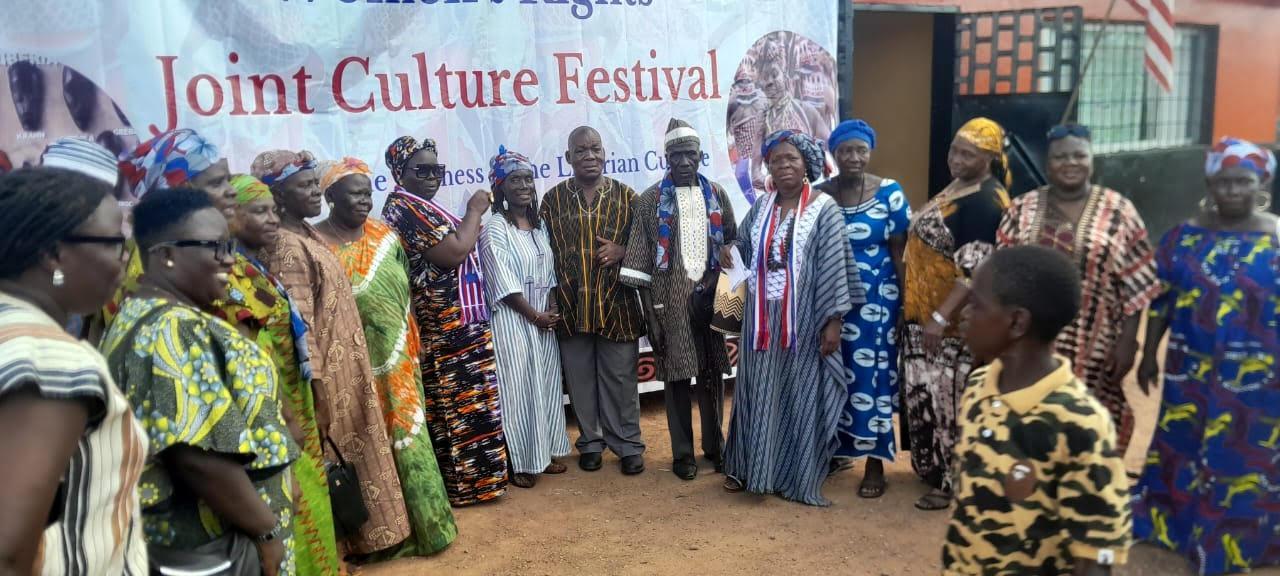Africa-Press – Liberia. ActionAid Liberia, in collaboration with the Ministry of Internal Affairs and several development partners, hosted a landmark one-day national cultural festival in Gbarnga, Bong County, aimed at promoting positive cultural values and advancing the rights of women and girls across Liberia.
The cultural festival, held under the theme “Celebrating Culture and Empowering Change,” brought together a broad coalition of traditional leaders, civil society organizations, government officials, and representatives from several counties, including Montserrado, Bong, Grand Gedeh, and Gbarpolu.
The initiative was made possible with funding support from the Embassy of Sweden and other international partners committed to the protection and promotion of human rights in Liberia.
The festival served as a platform for cultural celebration and reflection, while simultaneously tackling some of the longstanding issues surrounding harmful traditional practices that continue to affect women and girls, particularly in rural communities.
Through music, dance, traditional performances, and dialogue sessions, the festival sought to encourage communities to embrace cultural identity without compromising the dignity and rights of women and girls.
Participants began the celebration with a colorful caravan parade through the streets of Gbarnga, showcasing traditional costumes and music from different ethnic groups.
The day continued with cultural performances by representatives from each county, highlighting the diversity and richness of Liberia’s cultural heritage.
Madam Jasedeh Gbarzon, Rural Women President of Grand Gedeh County, served as the keynote speaker at the event. In her address, she called on traditional and religious leaders to support a cultural shift that preserves the country’s traditions while rejecting harmful practices, particularly female genital mutilation (FGM).
According to Madam Gbarzon, while culture is vital to national identity, it must not be used to justify practices that endanger the lives of women and girls.
“Our culture should uplift and unite us,” she said. “But there are parts of our traditions that hurt us, especially our girls. We cannot celebrate a culture that causes pain and limits potential. We must protect what is good and abandon what is harmful.”
She also called on the Ministry of Gender, Children and Social Protection and the Ministry of Internal Affairs to strengthen their partnerships with rural communities in order to build a national consensus around the promotion of positive cultural values that empower all citizens, regardless of gender.
Willet L. Salue, Program Officer at ActionAid Liberia, also addressed the gathering and emphasized that the festival was not merely for entertainment but for strategic engagement and advocacy. He noted that harmful cultural norms often serve as barriers to education, health care, and leadership opportunities for women and girls.
“We are not here to discard our culture, but to reform it,” Salue said. “Culture should not restrict women. It should help all of us grow. This platform is about ensuring that culture and human rights can coexist.”
He stressed that meaningful cultural reform is achievable only through inclusive dialogue and community-led actions that prioritize women’s voices and experiences.
He further commended the participating counties for their performances and acknowledged their dedication to promoting cultural preservation in a more progressive and respectful manner.
Among the highlights of the festival was the presentation of an award to Bong County by Liberia’s National Cultural Ambassador, Kekura Malawala Kamara. Bong County was recognized for its outstanding performance and cultural display, which demonstrated both creativity and a commitment to promoting non-harmful traditional values.
In his remarks, Ambassador Kamara stressed the importance of cultural pride and identity in nation-building. He encouraged all communities to celebrate their traditions while taking a critical look at the aspects that may no longer serve the collective good.
“Our culture should be a bridge, not a barrier,” Kamara said. “This festival is proof that we can honor our roots while evolving into a society that respects the rights of all its people.”
The event attracted national attention, drawing the presence of high-ranking traditional leaders, including Arthur Gonwah, Chairman of the National Council of Chiefs and Elders, senior government officials, development partners, international organizations, and local activists.
Madam Elizabeth Gbah Johnson, Country Director of ActionAid Liberia, also attended and reaffirmed the organization’s commitment to working with communities to eliminate harmful practices while preserving positive cultural identities. She emphasized that development and cultural integrity are not mutually exclusive.
As the event concluded, representatives from ActionAid Liberia, the Ministries of Internal Affairs and Gender, various UN agencies, the embassies of Sweden and Ireland, and community-based organizations jointly pledged their continued support to cultural reform efforts across the country.
The festival not only celebrated Liberia’s diverse cultural tapestry but also marked a growing shift in how culture is being used as a tool for empowerment rather than oppression. The event closed with a unified call to action for communities to actively participate in building a Liberia where culture uplifts all citizens and promotes justice, equality, and sustainable development.
For More News And Analysis About Liberia Follow Africa-Press






